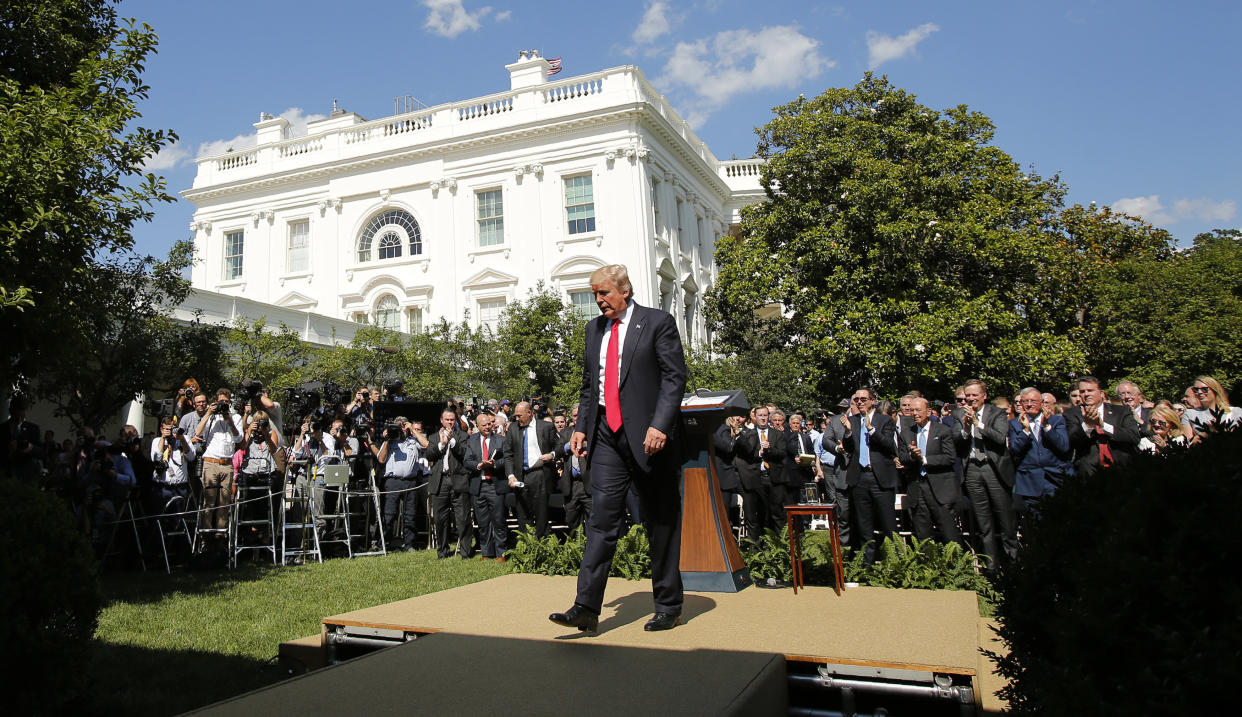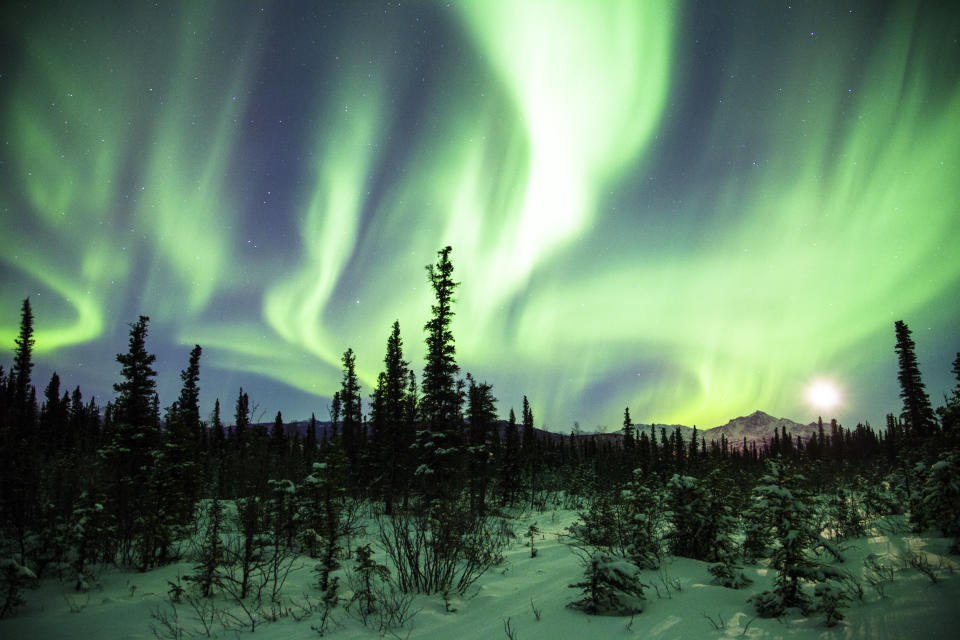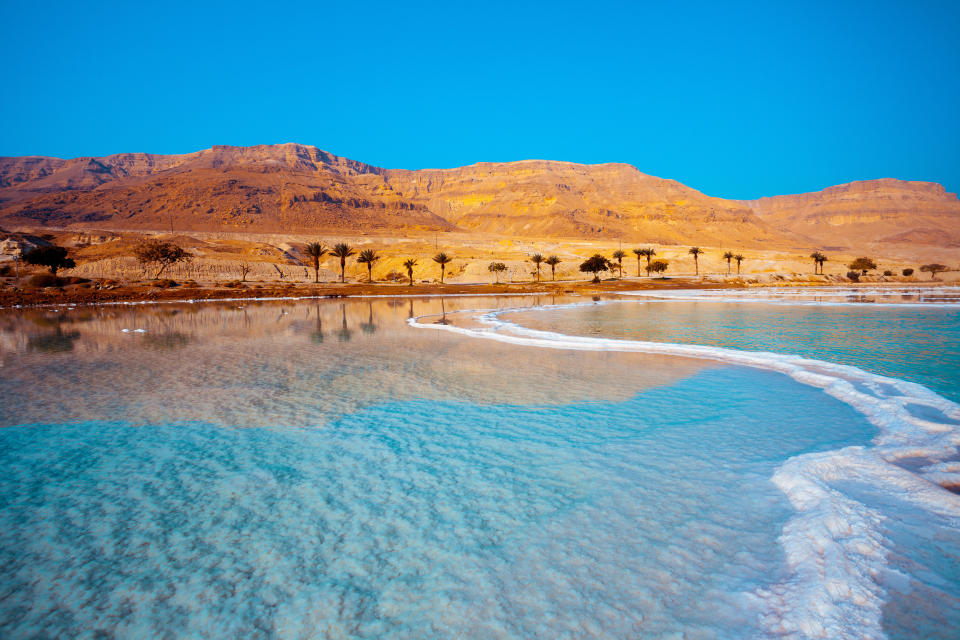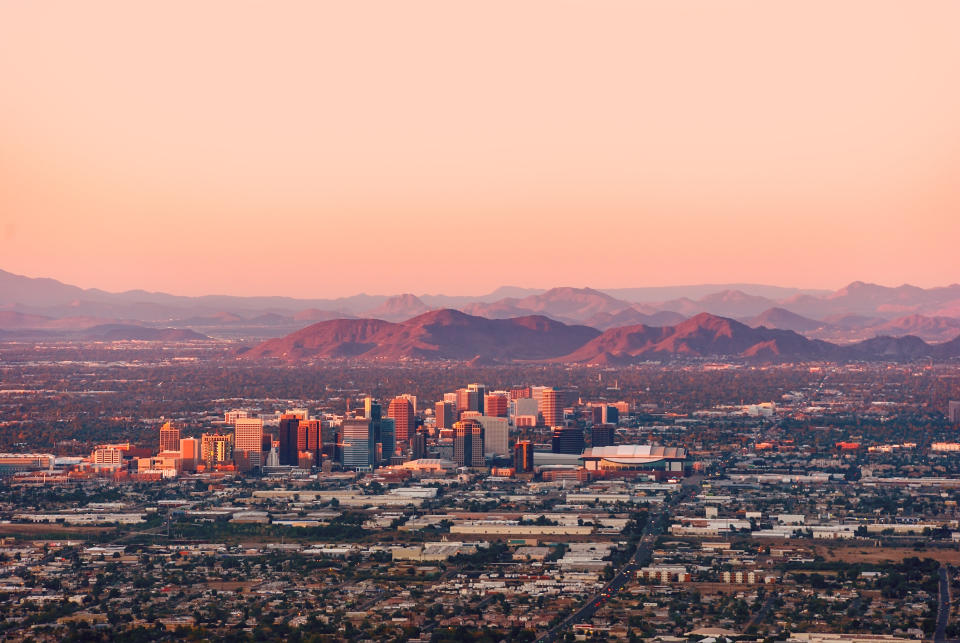Most Americans Wanted The U.S. To Stay In The Paris Agreement. Will It Matter In 2020?

Most Americans probably weren’t thrilled on Thursday when President Donald Trump announced he plans to pull the United States out of the Paris Agreement on climate change.
Sixty-one percent of Americans wanted the U.S. to stay in the Paris accord, according to a HuffPost/YouGov survey taken before Trump’s decision was announced, and just 17 percent wanted the U.S. to withdraw.
Democrats were the staunchest supporters of the historic climate pact, saying by a 76-point margin that the U.S. should remain in it, but independents and Republicans agreed by margins of 39 points and 7 points, respectively.
Trump voters were one of the few demographics to outright favor withdrawal, which the president has touted as a populist position. His supporters said by a 15-point margin that the U.S. should leave.
A majority of the public, 58 percent, also wanted the nation to take a global leadership role in trying to prevent climate change ― a position that only one-fifth of Americans thought the U.S. was filling, even prior to Trump’s announcement this week.
Other pollsters have found similar strong support for the Paris Agreement. Researchers at Yale’s Climate Change Communication program calculated that most residents of all 50 states wanted the U.S. to participate.
Americans have grown increasingly worried about climate change in recent years, although the extent of their concern remains limited. Forty-five percent of Americans now say they worry a great deal about global warming, according to Gallup, up from 32 percent in 2015.
Concerns have also grown increasingly polarized in recent years, as Democrats’ worries have sharply intensified and Republicans’ have remained relatively flat. More than 60 percent of Democrats, but just 15 percent of Republicans, consider dealing with climate change a top priority, according to a Pew survey from January.
“Environmentalism in the U.S. used to be a fairly bipartisan issue,” FiveThirtyEight’s Maggie Koerth-Baker noted Thursday. “The Environmental Protection Agency, founded in 1970, was a product of the Nixon administration. But somewhere around 1990, everything changed. And it changed quickly, in ways that had big impacts on our ability to negotiate international environmental accords like the Paris Agreement.”
The U.S. is due to exit the Paris Agreement on Nov. 4, 2020, one day after the next presidential election. Environmental groups are hoping that Trump’s decision will become a wedge issue in future elections, although it’s not clear how much influence environmental concerns will have at the ballot box.
“Trump has just elevated ‘the environment’ as a political issue in 2018 and 2020,” political handicapper Stuart Rothenberg tweeted Thursday. “And that definitely is not to his or the GOP’s advantage.”
But while many Americans disagree with Trump on environmental issues, the topic isn’t necessarily at the forefront of their minds. In a recent HuffPost/YouGov poll, just 14 percent picked the environment as one of their top issues, placing it ahead of foreign policy but far behind topics like health care, the economy and immigration. A open-ended survey that simply asked Americans to name the country’s most important problem found even less concern, with just 2 percent volunteering “the environment” or “pollution.”
Pulling out of the Paris Agreement “could elevate climate on the candidates’ agenda, which could have real governing effects going forward,” Bloomberg columnist Jonathan Bernstein argued. “But that’s about it. As far as substantive effects of this decision, good or bad, they are likely to be far too incremental and long-term to make any electoral difference at all.”
MORE OF THE LATEST POLLING NEWS:
REPUBLICANS FEEL DIFFERENTLY ABOUT CLIMATE CHANGE THAN ALMOST EVERYONE ELSE IN THE WORLD ― Christopher Ingraham: “[I]n 2015 the Pew Research Center polled 40 of the world’s countries on six different continents, asking people who lived there what they thought about climate change. About 45 percent of Americans told the pollsters they thought global climate change was a ‘very serious’ problem. That share’s not to far away from the global median of 54 percent across all 54 countries surveyed. But look what happens when you break out American Democrats and Republicans separately. Democrats, of course, are much more likely to be concerned about climate change: 68 percent say it’s a very serious problem, in line with numbers from developing nations where people tend to be more worried about these things. But only 20 percent of Republicans say it’s very serious. If American Republicans were a country, they’d be be virtually indistinguishable from people in Poland and China on the question of climate indifference. Put it another way: American Democrats are about 14 percentage points away from the global median on their climate concern. But Republicans are a stunning 34 points away from the center.” [WashPost]
MOST TRUMP VOTERS CONSIDER MEDIA THE ENEMY ― “As President Donald Trump continues his crusade against what he brands ‘fake news,’ 60 percent of those who voted for him view the media as their ‘enemy,’ according to a new HuffPost/YouGov poll. That’s up from the 51 percent of Trump supporters who gave that answer in a February survey. … As noted in February, the rating scale ― ally, friendly, unfriendly, enemy ― is one YouGov typically uses to measure Americans’ views of foreign countries rather than the Fourth Estate. But the metric seems newly appropriate for domestic use given Trump’s attitude toward the press, as well as record levels of political animosity. Indeed, 49 percent of Republicans consider the Democratic Party to be the ‘enemy,’ while almost the exact same number of Democrats ― 48 percent ― say that about the GOP.” [HuffPost]
HOW MANY OBAMA-TO-TRUMP VOTERS WERE THERE, REALLY? ― Geoffrey Skelley: “Different sources offer varying estimates of Obama 2012-Trump 2016 voters. The ANES found that about 13% of all Trump voters cast a ballot for Obama in 2012. Meanwhile, the CCES found a slightly smaller figure of around 11%. Lastly, the UVA Center for Politics poll found that about 15% of Trump voters claimed to have backed Obama four years earlier. Using these percentages (not rounded) and Trump’s overall 2016 vote total, estimates of the raw number of such Obama-Trump voters range from about 6.7 million to 9.2 million. That’s a wide range, and considering the caveats regarding voter recall of past votes, it is important to be clear about the relative uncertainty of these figures. Nonetheless, these surveys offer additional evidence about a critical part of the 2016 equation: the millions of voters who switched from Obama in 2012 to Trump in 2016.” [Sabato’s Crystal Ball]
TRUMP’S BASE STILL APPROVES OF HIS JOB PERFORMANCE, BUT WITH WANING INTENSITY ― Per the Economist/YouGov tracking poll, 50 percent of voters who backed Trump in last year’s election now say they strongly approve of the job he’s been doing, down from 66 percent immediately after his inauguration. The vast majority, 86 percent, still approve overall.
‘OUTLIERS’ ― Links to the best of news at the intersection of polling, politics and political data:
- Ron Brownstein digs into the demographics of the 2016 electorate. [Atlantic]
- Martin Wattenberg notes that Trump is less popular with Republicans than Vice President Mike Pence. [WashPost]
- Sean Illing interviews political scientists Christopher Achen and Larry Bartels about their theories of voter behavior. [Vox]
- David Rothschild breaks down Americans’ feelings on Trump’s presidential characteristics. [PredictWise]
- Dalton Bennett, Gregory Schneider, Laura Vozzella and Fenit Nirappil take a deep dive into the 2017 Virginia gubernatorial race. [WashPost]
- Cristina Marcos writes that Democratic National Committee allies are “incensed” by Hillary Clinton’s criticism of their data operation. [The Hill]
- A British study finds that party canvassers are more effective at raising turnout than changing minds. [Democratic Audit]
Want to get more stories like this? Sign up for our emails here.
Also on HuffPost
Love HuffPost? Become a founding member of HuffPost Plus today.
The Alps

Alaska

The Dead Sea

Phoenix, Arizona

This article originally appeared on HuffPost.
